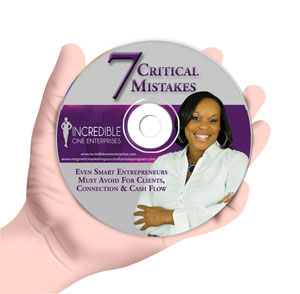A few weeks ago, I spoke to a group of business leaders working in a corporation. I was there to talk about leadership for women, but each of them wanted to learn all about being an entrepreneur full-time. And, trust me, I get it. When I worked in corporate, I, too, had visions of the glamorous life that entrepreneurs must live.
Wrong.
There is much more struggle than success in the land of entrepreneurship, but few will be honest enough to tell you that. Don’t get me wrong, I’ve “made” it, but it took work, thick skin and working harder than I ever worked for someone else. I find that most people aren’t willing to do the work so that is why they struggle as entrepreneurs. I had to remind the audience that no one goes to bed a blunder and wakes up a wonder and it can take YEARS to experience the glamorous life they are craving at the moment they leave their job.
So, when Sheila asked me to talk about how to transition from full-time employee to full-time entrepreneur without sacrificing her lifestyle I couldn’t wait to weight in. Check it out:
As I share in the episode, entrepreneurship is a gift, a privileged one that comes after having done real work to get fully clear about what it really takes to build a business that serves you. If you are a FT employee desiring to be a FT entrepreneur, here are a few things I recommend you keep in mind:
1. Make sure your why is about more than the fact that you hate your job and want to call the shots. If not, this will get old and you’ll easily tire of all that it takes, especially in the beginning when you are every department in your new company.
2. Make sure that the business you want to start solves a SPICE Problem for those who are willing to pay to access the solution. I’ve often said, “if there is no problem to be solved, there is no profit to be earned.” The universal law of business says – your goal is to “get found by a group of people who have the specific top of mind problem that you solve who are ready to invest in order to access a solution to that problem.” So, be sure that the problem you solve is one others will be willing to put a dime on.
3. Create a marketing and sales management plan. When it comes to marketing, don’t skimp on the market research. Take the time to learn the who and why of your potential customers and clients. Be sure to consider both primary and secondary market research to validate that you have a firm target market to position yourself so that you can identify your ideal clients and offer marketing and sales sequences to get them to invest in your products and services. Regardless of whether your clients will be consumers or businesses, don’t skip this step – it’s essential to your business’ viability. The importance of your sales plan is to make sure that you are generating income as quickly as possible.
4. Save at least 9-12 months of income to offset the potential cash flow issues that new business owners face. When you first get started, you’ll want one less headache or stressor around how you’re going to pay your bills. You might want to make some short-term sacrifices in order to make a long-term gain as your business grows. Ask yourself: do I really need that? I once had a client that turned off their cable and sold the three televisions in their home. That one sacrifice gave them $3,000 for their cash reserves. To this day, they aren’t watching television. Instead, they are reading and their business is growing as a result.
5. Establish the right legal entity. Be sure to talk with an attorney or tax advisor to make sure that you set your new business up the correct way. Not having the right legal entity can put your new business at risk from the start. Do yourself a favor and talk with a qualified professional so that you think beyond starting and what will support you and your family in the best possible way.
6. Give yourself a year to make sure that you are ready to transition. While you can decide any time you want to leave your job, I recommend that you set your date at least a year in advance so that you can effectively build your plan and start your business part-time. Your goal should be to have your first 3 to 5 clients BEFORE you turn in your two weeks notice. Sure, you may have to start by working nights and weekends to pull this off, but you can do it.
7. Set up your Board of Advisors. In my opinion, every business needs to have a group of advisors who will help to make sure that they build a successful business. These advisors may be made up of paid advisors or colleagues and centers of influence who can add value to your new business. In my early days, I met with my board of advisors once a quarter over dinner (my treat.) They offered insight and assessed my plans to keep me moving in the right direction. Eventually I started to hire consultants and coaches to help me in ways beyond what my board could do, as they had areas of specialty that I need to progress. To this day, I still meet with my advisors once a quarter and they still add value to my business.
If you’re desiring full-time entrepreneurship, take heed to my advice. I left my corporate career nearly 12 years ago and I haven’t looked back. It’s taken work, but I am blessed to make a living doing what I love. Want to be able to say the same? We should chat.
 ©2017 by Darnyelle A. Jervey. All Rights Reserved. Darnyelle A. Jervey, MBA, The Incredible Factor Business Optimization Coach and Mentor, is the founder of Incredible One Enterprises®, Incredible Factor University® and the Leverage Your Incredible Factor System®, a proven step-by-step program so you experience financial and spiritual abundance in your life because of your business. For more information and a FREE audio CD “7 Critical Mistakes Even Smart Entrepreneurs Must Avoid for Clients, Connection and Cash Flow!” just fill out the form below.
©2017 by Darnyelle A. Jervey. All Rights Reserved. Darnyelle A. Jervey, MBA, The Incredible Factor Business Optimization Coach and Mentor, is the founder of Incredible One Enterprises®, Incredible Factor University® and the Leverage Your Incredible Factor System®, a proven step-by-step program so you experience financial and spiritual abundance in your life because of your business. For more information and a FREE audio CD “7 Critical Mistakes Even Smart Entrepreneurs Must Avoid for Clients, Connection and Cash Flow!” just fill out the form below.






